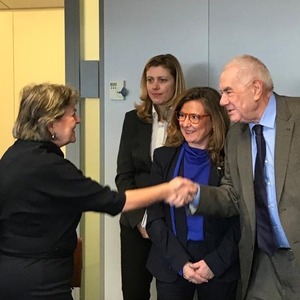The AMB calls for more resources for metropolitan areas from the European Union
| Subject: AMB
Ernest Maragall, AMB Vice-president of International Relations and Cooperation, leads political representatives from eight metropolitan areas in a meeting with Elisa Ferreira, the European Union's commissioner for Cohesion and Reforms. An increase in European financing would enable metropolitan areas to successfully deal with urgent matters such as air pollution, sustainable mobility, the effects of climate change and the rehabilitation of the housing stock. The group European Metropolitan Authorities (EMA), a network of European metropolises headed by the AMB, was also proposed to lead talks with the European Commission.
Ernest Maragall, AMB's vice-president for International Relations and Cooperation, leads political representatives from eight metropolitan areas in a meeting with Elisa Ferreira, the European Union's commissioner for Cohesion and Reforms. An increase in European financing would enable metropolitan areas to successfully deal with urgent matters such as air pollution, sustainable mobility, the effects of climate change and the rehabilitation of the housing stock. The group European Metropolitan Authorities (EMA), a network of European metropolises headed by the AMB, was also proposed to lead talks with the European Commission.
Today, 25 February, Ernest Maragall, AMB Vice-president for International Relations and Cooperation, headed a meeting in Brussels with Elisa Ferreira, the European Union's commissioner for Cohesion and Reforms, in which they discussed the role of metropolitan areas in the context of Europe. He also called for more funding and a more prominent role in the decision-making process, as well as the creation of a metropolitan workspace, which is currently not on Europe's future urban agenda. Political representatives from the metropolitan areas of Rome, Lyon, Bilbao, Porto, Helsinki, Gdansk and Katowice also attended the meeting.
The EMA, the great forum for European metropolitan areas
Maragall seized the opportunity to present to Ferreira the group European Metropolitan Authorities (EMA), a meeting point for European metropolitan governments (European Union and Norway), which now has 46 members.
This initiative, created in 2015 and led by the AMB, promotes political dialogue between metropolitan areas and cities, European institutions, international organisations (OCDE) and national governments. Its objective is to provide a forum in which to discuss the challenges of European metropolitan governance and define the basis for a common association.
The EMA holds an annual political conference, which in recent years has taken place in the cities of Barcelona (2015), Turin (2016), Warsaw (2017), Rome (2018) and Lyon (2019). This year's edition will be held in Porto on 5th and 6th November.
Thanks to this political forum, a number of EU-funded projects have been launched, such as the impact of large infrastructure (RiConnect), the management of European funds by metropolitan areas (CAMELOT) and the management of sustainable mobility by metropolitan areas (SMART MR).
It has also resulted in comparative studies, political declarations and a platform that represents metropolitan interests before the European Commission, the European Parliament and the Committee of the Regions.
Metropolises, the future of Europe
During the meeting, Maragall stressed the role that metropolitan areas play throughout Europe as pillars of welfare and opportunities and drivers of innovation and productivity. Metropolises have become laboratories in which to seek solutions to current challenges related to globalisation, and play a crucial role in combating the climate emergency, promoting territorial cohesion and mitigating the effects of increasing inequalities. However, across most of Europe, the lack of efficient metropolitan governance structures, political recognition and access to financing undermines the ability to respond to these challenges.
And it is precisely in the content of the climate emergency that metropolitan areas must align with European policies. Maragall identified the AMB's main contributions to the European Green Deal with the following measures:
- Implementation of low emission zones throughout the metropolitan territory.
- Creation of a metropolitan bus fleet powered by green energy.
- The Bicivia network of metropolitan bike lanes.
- Generation of energy from waste at treatment facilities.
- A €100 million programme, with a loan from the European Investment Bank, to rehabilitate homes based on energy efficiency criteria.
To remedy the situation, Maragall proposed to the commissioner a partnership with the EMA to develop metropolitan indicators on an EU level, with funds allocated for this purpose.













































